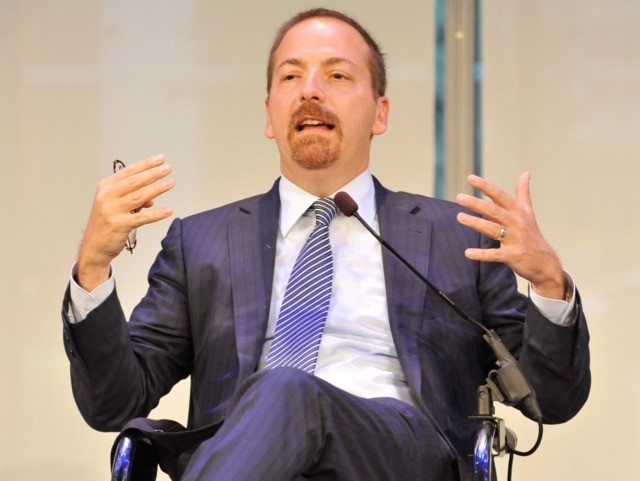Chuck Todd used his Meet the Press program Sunday on NBC to attack “fake news” — and blamed Russian disinformation, rather than shoddy journalism, for convincing Americans not to trust the mainstream media.
His show, featuring guests whom he described “top players in journalism, diplomacy and technology,” claimed that “Russian tactics” of “truth manipulation” have migrated right here to the United States.”
Todd’s primary culprit: the Trump administration, which he noted on day one pushed “an easily disprovable lie about his inaugural crowd size.”
He ignored the other “day one” lie: that Trump was colluding with Russia, a lie the media pushed relentlessly.
Todd’s first guest was New York Times executive editor Dean Baquet, who admitted earlier this year that his newsroom had been built around the Russia story for two years.
Todd did not ask Banquet about that: instead, he asked Baquet about whether “the truth itself is on trial,” an idea with which Baquet enthusiastically agreed.
Next, Todd turned to Martin Baron, the executive editor of the Washington Post — another paper that pushed the Russia collusion hoax, and which also led the way in trying to debunk Rep. Devin Nunes (R-CA)’s effort, recently vindicated, to expose the truth about the FBI’s abuse of the Foreign Intelligence Surveillance Act (FISA) courts.
Baron complained: “We live in an environment where people are able to spread crazy conspiracy theories and absolute falsehoods and lies.” He blamed social media — not the conspiracy theories validated by his own paper.
Baron also griped that Americans had become “numb” to the supposedly “15,000 false or misleading claims” by the president that his paper has been tracking. Not only are many of those supposedly false “claims” actually true, or defensible differences of opinion, but the Post is seemingly numb to the major anti-Trump lies it has pushed.
Todd asked Baquet if journalists would have to “market” the idea that they are there to tell the truth — in the course of continuing to push the idea that Russian propaganda, not media malpractice, is to blame to public mistrust.
Baquet said that he and Baron needed to continue “very aggressively defending our institutions, defending the truth and defending our important role in democracy.”
Again, no mention of the corrosive effect that the Russia hoax has had on our democracy — or the role that the media has played in the ongoing impeachment debacle over Ukraine, including the Post‘s own misreporting of leaked testimony from closed-door hearings in the House Intelligence Committee.
Todd would not admit that the media’s leading institutions had failed by their own standards — only that they might be “culturally” out of touch with the rest of America.
“I think we cannot dismiss everybody who supported Donald Trump,” Baquet offered, somewhat generously.
The rest of the program was devoted to the idea that Russian disinformation, and distrust of the media spread by Trump and the Republicans, was to blame for declining public confidence in journalism.
Not once did Todd look at the media’s role in pushing conspiracy theories in a barely-disguised effort to take down the president.
Joel B. Pollak is Senior Editor-at-Large at Breitbart News. He earned an A.B. in Social Studies and Environmental Science and Public Policy from Harvard College, and a J.D. from Harvard Law School. He is a winner of the 2018 Robert Novak Journalism Alumni Fellowship. He is also the co-author of How Trump Won: The Inside Story of a Revolution, which is available from Regnery. Follow him on Twitter at @joelpollak.

COMMENTS
Please let us know if you're having issues with commenting.